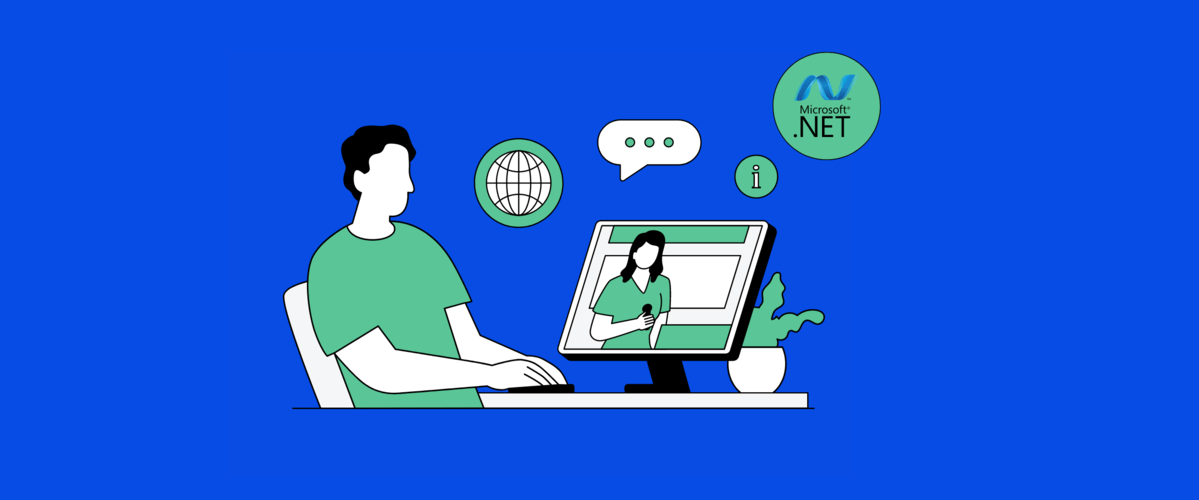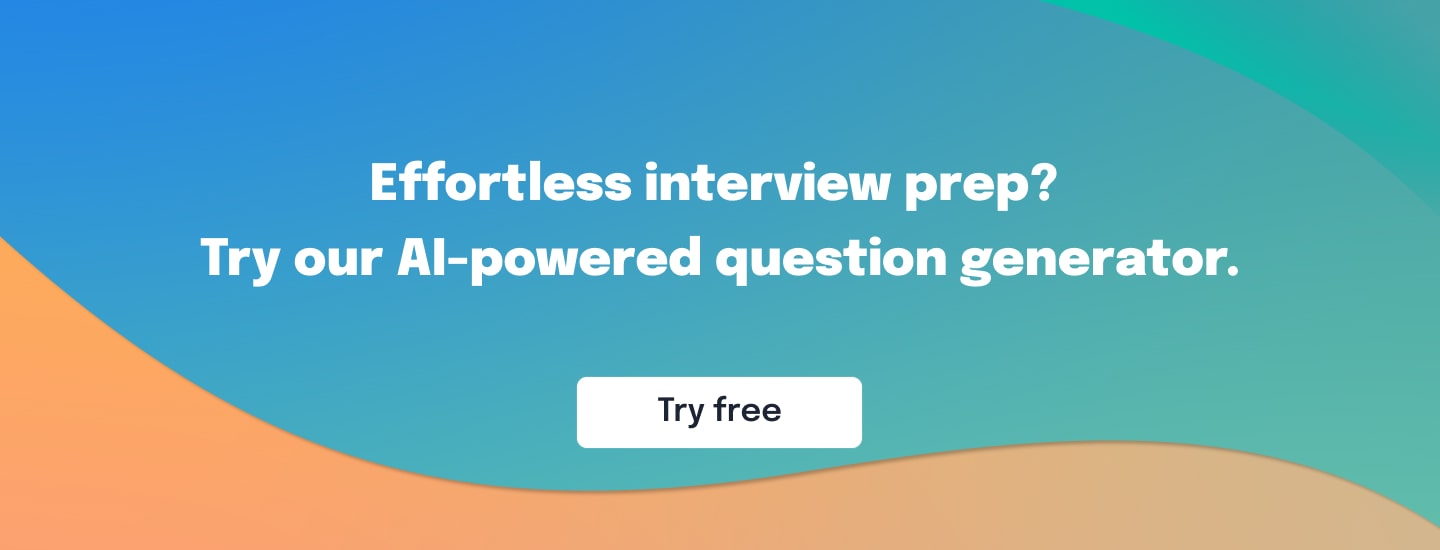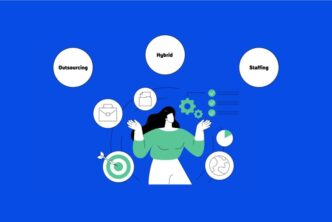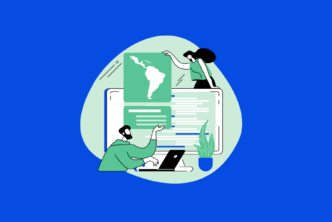On YouTeam, .Net developers consistently rank among the top 10 hiring requests from our clients. It is the result of the high demand for skilled .Net developers in the industry. Due to the popularity of .Net and the increasing number of companies utilizing this technology, competition for the best talent has grown.
In fact, based on our marketplace’s data, the average hourly rate for middle .Net developers is slightly higher than the average rates across our platform.
If you’re wondering about the expected compensation rate for middle .Net developers, it typically falls within the range of $40-60 per hour, as per our marketplace’s insights. (You can learn more about differences in compensation depending on developer experience and location using a free tool YouRate.)
Yet, there’s hope. As .Net is not a new technology, the chances of finding a skilled candidate are more than real.
YouTeam is dedicated to the art of matching. We have built our entire company around the idea of connecting the best talent with the best companies that can truly benefit from their skills. We understand that hiring is not just about technical expertise; it’s about finding the right fit for your company’s culture and goals.
We want to help you find the right contributor for your team. Therefore, we created this article.
In this article, we’ll guide you with a list of 10 essential questions to ask during the interview process. To delve deeper into each topic and gain a more comprehensive understanding of candidates’ skills and experience, we’ll also provide two follow-up questions for each.
By the end of this post, you’ll be ready for future interviews and make informed hiring decisions.
The last thing before we dive in is a link to “A Complete Guide on Hiring .Net Software Developers in 2023”; we thought you might want to read it later. And now, let’s get started!
Table of Contents
1: What experience do you have with the .Net framework?
- Explanation: This question is important to gauge the candidate’s familiarity with the .Net framework, which is the foundation of any .Net development.
- Expected Answer: The candidate should demonstrate a solid understanding of the .Net framework and provide examples of specific projects they’ve worked on using .Net technologies. Look for experience with various components of the framework, such as ASP.NET, WPF, or Entity Framework.
1.1: Can you provide examples of projects where you utilized specific .Net technologies?
- Explanation: This follow-up question helps to assess the candidate’s practical experience with different aspects of the .Net framework, beyond just theoretical knowledge.
- Expected Answer: The candidate should be able to explain how they have specifically used different .Net technologies in real-world projects, outlining the problem it solved or the benefits it brought to the project.
1.2: How have you leveraged the features of the .Net framework to optimize performance or enhance security?
- Explanation: This question digs deeper into the candidate’s understanding of the advanced features and capabilities of the .Net framework.
- Expected Answer: The candidate should be able to discuss techniques or strategies they have employed to optimize code performance or enhance security using features provided by the .Net framework.
2: Describe your experience working with C# and object-oriented programming.
- Explanation: C# is the primary language used in .Net development, and object-oriented programming is fundamental to writing structured and maintainable code.
- Expected Answer: The candidate should demonstrate a solid understanding of C# and its features, such as classes, inheritance, and polymorphism. They should be able to discuss how they have applied object-oriented programming principles in their projects.
2.1: Have you implemented any design patterns in your projects? If so, which ones and why?
- Explanation: Design patterns showcase a candidate’s understanding of software architecture and their ability to apply proven solutions to common software design problems.
- Expected Answer: The candidate should be familiar with common design patterns, such as Singleton, Factory, or Observer, and provide examples of how they have used them in their projects to improve code structure or maintainability.
2.2: How do you ensure your code follows best practices for code reuse and maintainability?
- Explanation: This question evaluates the candidate’s ability to write clean, modular, and reusable code.
- Expected Answer: The candidate should discuss their approach to designing code for maximum reusability and maintainability, including their use of SOLID principles, coding conventions, and code documentation.
3: How do you stay updated with the latest trends and advancements in the .Net ecosystem?
- Explanation: The .Net ecosystem evolves rapidly, and it’s important for developers to stay up-to-date with the latest tools, frameworks, and best practices.
- Expected Answer: The candidate should demonstrate a proactive approach to learning and showcase their engagement with the .Net community, such as attending conferences, participating in online forums, or contributing to open-source projects.
3.1: Can you give an example of how you applied a new technology or framework in a project?
- Explanation: This question helps assess the candidate’s ability to adopt new technologies and adapt to changing development trends.
- Expected Answer: The candidate should provide a concrete example of a project where they implemented a new technology or framework, explaining the benefits it brought and any challenges they encountered during the process.
3.2: How do you evaluate the feasibility and potential impact of adopting new technologies in a project?
- Explanation: This question evaluates the candidate’s critical thinking skills and their ability to assess the suitability of new technologies for different situations.
- Expected Answer: The candidate should discuss their process for evaluating the feasibility of adopting new technologies, considering factors such as project requirements, scalability, maintenance, and team proficiency.
4: Describe a difficult technical problem you encountered in a previous project and how you resolved it.
- Explanation: This question showcases the candidate’s problem-solving abilities and their ability to handle challenging situations.
- Expected Answer: The candidate should provide a specific example of a technical challenge they faced, explain the steps they took to analyze and troubleshoot the issue, and describe the solution they implemented.
4.1: How did you communicate the problem and solution to your team or stakeholders?
- Explanation: Effective communication is crucial in software development, and this question assesses the candidate’s ability to articulate technical concepts to non-technical audiences.
- Expected Answer: The candidate should explain how they effectively communicated the problem and their solution to their team or stakeholders, highlighting any challenges they faced and the strategies they used to overcome them.
4.2: What did you learn from dealing with this technical problem, and how did it impact your future approach to problem-solving?
- Explanation: This question evaluates the candidate’s ability to learn from past experiences and continuously improve their skills.
- Expected Answer: The candidate should reflect on the lessons they learned from the technical problem, explain how it shaped their problem-solving approach, and discuss any changes they implemented to prevent similar issues in the future.
5: How do you approach testing and quality assurance in your development process?
- Explanation: Testing and quality assurance are critical aspects of software development, ensuring that the final product meets the required standards.
- Expected Answer: The candidate should demonstrate an understanding of different testing methodologies and discuss their approach to testing, including the use of unit tests, integration tests, or automated testing frameworks.
5.1: Can you provide an example of a challenging bug you encountered during testing and how you resolved it?
- Explanation: This question assesses the candidate’s debugging skills and their ability to find and fix issues in code.
- Expected Answer: The candidate should describe a specific bug they encountered during testing, explain the steps they took to identify and resolve the issue, and discuss any strategies they used to prevent similar bugs in the future.
5.2: How do you ensure the quality of your code and maintain clean, readable, and maintainable codebases?
- Explanation: This question evaluates the candidate’s understanding of code quality and their commitment to writing clean and maintainable code.
- Expected Answer: The candidate should discuss their code review process, the use of coding standards, and any additional strategies they employ to ensure the quality of their code and promote maintainability.
6: How do you ensure the security of your code and protect sensitive data?
- Explanation: Security is a crucial aspect of software development, ensuring that the final product is safe from hacking and other cyber threats.
- Expected Answer: The candidate should demonstrate an understanding of security best practices, such as using encryption, implementing secure authentication, and following secure coding standards.
6.1: Have you ever detected a security vulnerability in code you were working on? If so, how did you respond?
- Explanation: This question assesses the candidate’s ability to identify and respond to security risks.
- Expected Answer: The candidate should describe a specific instance where they detected a security vulnerability in code, explain the actions they took to address the issue, and discuss any lessons they learned from the experience.
6.2: How do you stay current with the latest security threats and vulnerabilities and proactively mitigate them in your code?
- Explanation: This question evaluates the candidate’s commitment to staying up-to-date with security trends and their ability to identify and mitigate risks proactively.
- Expected Answer: The candidate should discuss their involvement with security communities or forums, their experience with threat modeling, and any other steps they take to remain vigilant against security vulnerabilities.
7: How do you collaborate with other developers, designers, and stakeholders in a project?
- Explanation: Collaboration is essential in software development, ensuring that all team members are working towards the same goals and aligned with the project’s vision.
- Expected Answer: The candidate should demonstrate an ability to work effectively in a team, using Agile methodologies such as Scrum, Kanban, or Extreme Programming.
7.1: What role do you typically take on in a team project, and how do you communicate your progress and challenges to your team?
- Explanation: This question assesses the candidate’s communication skills and their ability to work collaboratively in a team environment.
- Expected Answer: The candidate should describe their past experiences working in a team and explain the roles they have taken on, highlighting their strengths and weaknesses. They should also discuss their communication strategies, such as daily stand-ups, sprint reviews, or project retrospectives.
7.2: How do you approach conflicts or disagreements with other team members or stakeholders?
- Explanation: Conflicts and disagreements are common in team projects, and this question evaluates the candidate’s conflict resolution skills.
- Expected Answer: The candidate should describe their approach to handling conflicts, emphasizing their willingness to listen to others’ perspectives, find common ground, and seek feedback from team members and stakeholders.
8: What motivates you in your work, and how do you continue learning and growing as a developer?
- Explanation: Motivation and continuous learning are critical aspects of software development, ensuring that developers remain engaged and committed to their work.
- Expected Answer: The candidate should demonstrate a passion for software development, exploring personal projects or contributing to open-source initiatives. They should also describe their approach to learning and personal growth, such as attending industry conferences, taking online courses, or collaborating with more experienced developers.
8.1: Can you describe a personal project or a contribution to an open-source initiative you have worked on?
- Explanation: This question assesses the candidate’s initiative and their willingness to go beyond their daily job responsibilities.
- Expected Answer: The candidate should provide a specific example of a project or contribution they have made, explaining the challenges they faced, the skills they developed, and the impact their work had on the community.
8.2: How do you ensure a work-life balance and manage stress and burnout in your work?
- Explanation: Burnout and stress are common issues in software development, and this question evaluates the candidate’s self-care skills.
- Expected Answer: The candidate should describe their approach to balancing work and personal life, such as practicing mindfulness, engaging in physical exercise, or taking breaks when necessary.
9: How do you handle feedback, both giving and receiving it?
- Explanation: Feedback is crucial in the development process as it helps improve the quality of work and collaboration within the team.
- Expected Answer: The candidate should demonstrate their ability to provide constructive feedback to their colleagues and stakeholders and explain how they handle receiving feedback by actively listening, seeking clarifications, and incorporating the feedback into their work.
9.1: Can you provide an example of a time when you had to give difficult feedback to a colleague or team member?
- Explanation: This question assesses the candidate’s ability to handle challenging situations and provide constructive feedback in a professional and empathetic manner.
- Expected Answer: The candidate should share a specific example where they had to deliver difficult feedback, explain how they approached the situation, and discuss the outcome of their feedback.
9.2: How do you respond to feedback that you receive, especially if it is critical or negative?
- Explanation: This question evaluates the candidate’s ability to handle feedback and their willingness to learn and improve from it.
- Expected Answer: The candidate should describe their approach to receiving feedback, such as staying open-minded, seeking clarifications if needed, and taking proactive steps to address the feedback in their work.
10: Can you describe a complex technical problem you faced and how you approached solving it?
- Explanation: This question assesses the candidate’s problem-solving skills and their ability to break down complex problems into manageable steps.
- Expected Answer: The candidate should provide a specific example of a complex technical problem they encountered, explain how they analyzed and understood the problem, and outline the steps they took to find a solution.
10.1: What resources do you typically use when faced with a technical problem that you don’t immediately know how to solve?
- Explanation: This question evaluates the candidate’s resourcefulness and their ability to leverage available resources to find solutions.
- Expected Answer: The candidate should discuss the resources they rely on, such as documentation, online forums, colleagues, or other technical communities.
10.b: How do you ensure that the solution you implemented is efficient and scalable?
- Explanation: This question assesses the candidate’s ability to consider the long-term implications of their solutions and their understanding of efficient and scalable programming practices.
- Expected Answer: The candidate should discuss their approach to code optimization, scalability considerations, and their awareness of industry best practices for efficiency.
Final thoughts
In this blog post, we have covered ten essential questions to ask when interviewing middle .Net developers. These questions will help you evaluate the candidate’s technical skills, problem-solving abilities, learning mindset, and dedication to quality. Remember to follow up on each question with additional probing questions to truly uncover the candidate’s capabilities and fit within your organization. By utilizing these questions, you’ll be able to conduct effective interviews and make well-informed hiring decisions.
As you conduct your interviews, remember that finding the right candidate is not just about technical expertise but also about their ability to collaborate, communicate, and fit within your team’s culture. Use these questions as a foundation, but also be sure to tailor them to your company’s unique needs and values.
If you want to streamline and customize your developer vetting process, consider using i1, an AI assistant specialized in vetting talent. By leveraging its deep learning capabilities, you can create a custom interview process based on your company’s unique standards and values. This will give you more control over the vetting and ultimately help you find the perfect developer for your team.
Good luck with your interviews, and remember that finding the right candidate is a journey. Use these questions as a guide, but always trust your instincts and make sure the candidate aligns with your company’s goals and values. Happy hiring!






